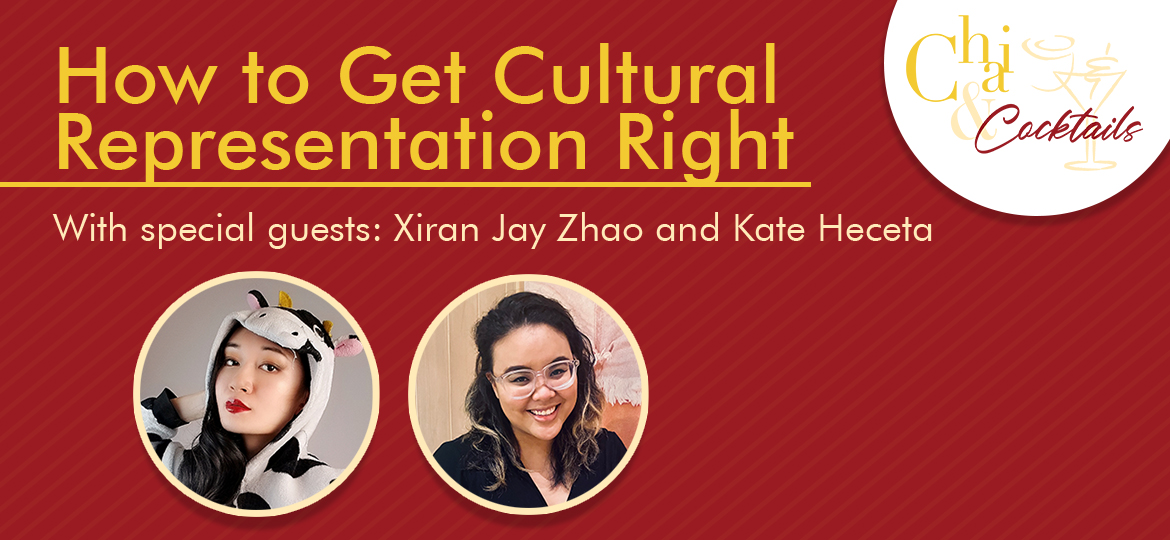At the third installment of Chai and Cocktails, Brianna da Silva led a discussion with Kate Heceta and Xiran Jay Zhao on the pitfalls of cultural representation, how to accurately represent cultures outside of your own, and much more.
Here are some of the highlights from that conversation.
First, Meet the Panelists
Kate Heceta is a 27-year-old pseudo-adult, as she calls herself, living and working in the Philippines. She radiates true tita (the Filipino word for ‘auntie’!) energy by dispensing wisdom to her friends, such as drink water and get some sleep. But then totally negates that image by failing to follow said wisdom herself, she admitted.
She’s also obsessed with essential oils, Tiger Balm/Vicks VapoRub, thirty-minute recipes, furniture and appliances, and cute kitschy coffee shops. Aside from books, Kate also loves horror movies, sharks, dinosaurs, outer space, and the ocean. She champions diversity, meaningful representation, and giving a damn. Her blog, YouTube, and Instagram are her little safe spaces on the Internet to recommend diverse reads, discuss representation and advocacy, and promote Filipino authors and books.
Xiran Jay Zhao is an admitted meme-loving shitposter and a published author. They are a first generation immigrant to Canada originally from Huai’an, China, home of Journey to the West author Wu Cheng’en. An upcoming disease research graduate from Vancouver’s Simon Fraser University, they wrote outlandish sci-fi and fantasy books while they probably should’ve been studying more biochemical pathways. You can find them on Twitter for daily shitposts about books, anime, comics, feminism, and Chinese history, on Instagram for cosplays and very Extra outfits, and on YouTube for videos about Chinese history and culture.
Raya and the Last Dragon Trailer Lacks Sincerity
The panelists discussed the trailer for Raya and the Last Dragon and the reasons why it fell short in accurate South-East Asian representation.
Despite early reactions, Kate Heceta explained her reasoning.
“I try to make it a habit to not pass judgement on any movies or books I haven’t seen or read yet,” Heceta said. “In the trailer it states it’s South-East Asian inspired but the countries in that region are vastly different.”
Through her analysis of the lacking Chinese representation in Mulan, Xiran Jay Zhao spots the similarities.
“It was insincere. While I’m not South-East Asian, the issue I have with Raya is that they have 7 different shades of European princesses and they all come from distinct cultures,” Zhao said. “With Raya, as a South-East Asian Inspired film, why do they only have one princess for the entire region.”
Writing About a Culture That Isn’t Your Own
When choosing to write about characters outside of your culture Zhao shared some advice.
“If you’re writing something that’s based in a culture that’s not your own and that you didn’t grow up in, it’s going to fundamentally be a caricature of what that culture actually is,” Zhao said.
Zhao explained why it would alter the story’s authenticity. “You didn’t grow up with that culture so you wouldn’t understand all the nuances,” Zhao said.
The panelists agreed that the onus should be on the gatekeepers to hire more POC.
“Big media production companies have the power to hire creators from those cultures, but if you choose to hire white people instead — that’s a decision that you are consciously making to exclude those creators,” Zhao said.
Zhao went on to share the profitable gains from taking on a specific culture.
“If you’re going to be making a profit off the aesthetics of someone else’s culture then you should make an effort to find creators of that culture and lift them up,” Zhao said.
For the entertainment industry, it all begins with story, Heceta shared the drawbacks to writing outside of your culture.
“The story can’t be about the characters being a person of color if you’re not of that culture because that’s not an experience that you are intimate with,” Heceta said.
Heceta went on to share that characters can be diverse but their storylines matter.
“It’s not necessarily bad to have one of your characters be from a different culture but the story can’t revolve around that specific cultural experience,” Heceta said. “You’re not going to be able to tell that story authentically. You also have to ask yourself, is this my seat to take at the table?”
Entertainment Industry Gatekeepers Lack Diverse Perspectives
Those who hold positions of power in the industry are disproportionately lacking in diversity, which trickles down to the media they produce. Zhao experienced firsthand the lack of representation within the publishing industry.
“As an author, so far all my gatekeepers — my agents, editors — have all been white,” Zhao said.
“It feels really surreal to me that I can swear up and down in Chinese in my book and say that means peace among worlds and none of my gatekeepers would know,” Zhao added.
Zhao added the system the industry is built on is fundamentally flawed.
“I don’t think we can ignore the fact that to become a publishing gatekeeper, I think you have to inherently be privileged to be able to pursue those jobs,” Zhao said. “Especially as an agent – they make pennies for the first few years of their career and so many people of color don’t have the privilege to be able to risk everything to go into that.”
Examples of Media That Got Representation Right
Reaching behind her to grab the book Raybearer by Jordan Ifueko, Kate Heceta explained, “It’s never specifically stated but you can tell that certain cultures in it are meant to represent specific places.”
“It’s not a generic mish mash and I really enjoyed the cultural diversity that was present in this book,” she adds.
Zhao shared her top pick: “I really enjoyed Slay by Brittney Morris because it goes deep into the discourse of how being Black isn’t a monolith.”
Watch the Entire Panel
An insightful and exciting conversation for writers and creators alike, be sure to watch the full conversation below:

